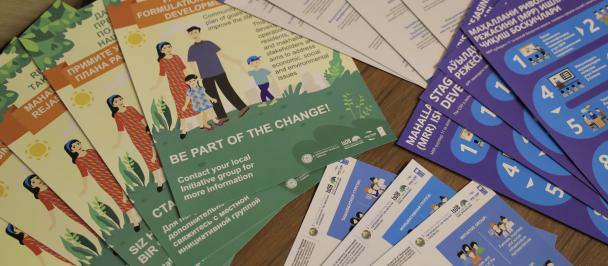UNDP is launching a new initiative focusing on socio-economic infrastructure development and improving access to basic services in collaboration with the Ministry of Economic Development and Poverty Reduction of the Republic of Uzbekistan, with the financial support of the Islamic Development Bank

June 8, 2022, Tashkent, Uzbekistan. Today, a new joint initiative of the United Nations Development Programme, the Ministry of Economic Development and Poverty Reduction (MEDPR) and the Islamic Development Bank (IsDB) was launched to strengthen the capacity of rural communities in infrastructure management in the Aral Sea region. This project is part of a broader investment project on Sustainable Rural Development in Uzbekistan to be financed by the Islamic Development Bank (IsDB) and the OPEC Fund for International Development. Five million US dollars were allocated for the implementation of this project.
The main objective of the new UNDP project is to empower and strengthen the capacity of the local communities, architects and engineers, local authorities and other stakeholders in designing and implementing rural development plans using suitable green and energy efficient as well as digital solutions.
In particular, the project will strengthen the capacity of targeted local communities to identify the needs of local population and develop action plans. In addition, the project plans to train representatives of local architectural and design institutes and regional departments of architecture and construction to develop improved engineering designs and master plans in line with sustainable development with a focus on economic, operational and environmental sustainability. The project also includes measures to strengthen the local governance mechanism and community participation in the planning and implementation of rural development programs and initiatives through digitalization, innovative IT solutions, including the development of digital infrastructure and information systems, that will contribute to capacity building in the construction sector, architectural design and the provision of public services.
Why Aral Sea Region?
The Aral Sea region is the most vulnerable region that has been adversely affected by the drying up of the Aral Sea and climate change, which has led to a number of socio-economic and environmental issues affecting the standard of living of the population in the Aral Sea region. Climate change leads to additional and increasing challenges to human development in areas affected by the Aral Sea disaster, where low incomes, increasing salinization of land and water resources, food insecurity, exposure to dust storms, poor drinking water quality and deteriorating local health population is forcing many to endure harsh living conditions or migrate out of the region.
The new UNDP project will cover the areas of the Aral Sea region, including the Republic of Karakalpakstan, the Khorezm, Navoi and Bukhara regions, which are the most affected by the environmental crisis.
In general, the new project to be implemented by UNDP will enable communities to identify their development priorities and needs through creation of community development plans that will form the basis for the implementation of construction and investment projects. In addition, the introduction of green and innovative technologies in construction and architectural planning will allow to build infrastructure facilities that will meet new modern requirements, and, at the same time, lead to efficient use of energy. Work will be carried out to introduce low-GWP (global warming potential) water- and energy-efficient, new agricultural, ozone-friendly technologies in different sectors/purposes in a balanced manner.
‘This project will be an excellent opportunity to combine the efforts of the Government, the Islamic Development Bank and UNDP in the implementation of specific solutions aimed at improving the livelihoods of the population of the Aral Sea region and ensuring decent access to resources and services for rural population’.Ms. Matilda Dimovska, UNDP Resident Representative in Uzbekistan

 Locations
Locations




